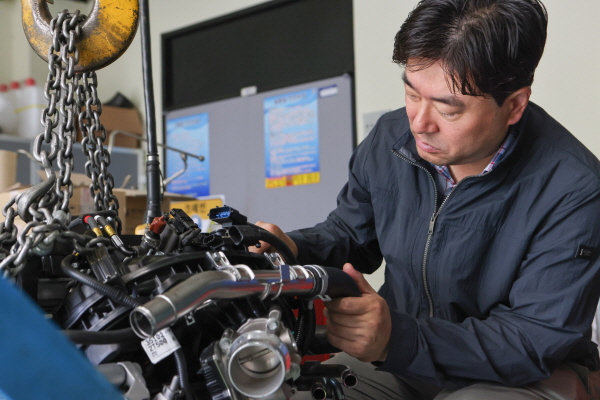세계적으로 탄소중립을 위한 수소 모빌리티 기술 경쟁이 치열한 가운데, 수소를 100% 연료로 사용하는 승용차용 수소엔진 기술이 국내 최초로 개발돼 내연기관 차량의 즉각적인 탄소중립을 이끌어 낼 수 있을 것으로 기대가 모아진다.
기계연·현대차 공동 개발, 내연기관 탄소중립 기대
세계적으로 탄소중립을 위한 수소 모빌리티 기술 경쟁이 치열한 가운데, 수소를 100% 연료로 사용하는 승용차용 수소엔진 기술이 국내 최초로 개발돼 내연기관 차량의 즉각적인 탄소중립을 이끌어 낼 수 있을 것으로 기대가 모아진다.
과학기술정보통신부 산하 한국기계연구원(원장 박상진) 모빌리티동력연구실 최영 책임연구원과 현대기아자동차(회장 정의선) 탈탄소엔진리서치랩 백홍길 연구위원 공동연구팀은 수소연료만 100% 사용하는 ‘직접분사식 수소엔진’을 개발하고, 성능평가를 통해 세계 최고 수준의 우수성을 입증했다.
기계연·현대차 공동연구팀은 기존 현대자동차 하이브리드 차량 엔진에 수소를 30배 기압 이상의 압력으로 연소실 안에 직접 분사하고, 엔진의 성능을 높이는 터보차저를 이용해 시동부터 엔진 부하가 높아질 때까지 모든 영역에서 높은 열효율로 유지해 안정적인 운전을 구현했다.

▲기계연 모빌리티동력연구실 최영 책임연구원이 수소엔진을 점검하고 있다.
기존의 ‘포트분사식 수소엔진’은 기체 상태인 수소연료가 차지하는 공간 때문에 연소실에 공기 유입이 줄어들어 효율성이 떨어지고, 수소연료와 공기의 역화로 인해 엔진성능이 감소하는 문제가 발생했다.
반면 연구팀이 개발한 ‘직접분사식 수소엔진’은 고압의 수소연료를 연소실에 직접 분사하기 때문에 역화 문제를 원천적으로 해결했으며, 높은 압축비와 연료 성층화, 초희박연소를 통해 열효율을 극대화하면서 출력 성능을 향상시키고 유해 배출물을 동시에 줄일 수 있다.
이번에 개발한 수소엔진은 가솔린 엔진 대비 이산화탄소(CO2) 배출은 99%, 미세먼지 배출은 90% 줄일 수 있으며, 이는 유럽의 무공해 자동차 기준을 충족한다. 또한, 자동차 배기가스를 정화하는 후처리 장치 없이도 15ppm이하의 질소산화물(NOx)를 배출하며, 최대 40%의 높은 열효율을 달성했다.
기계연 최영 모빌리티동력연구실장은 “개발된 수소엔진 기술은 자동차의 주된 동력원에 사용되고 있는 화석연료를 무탄소 수소연료로 대체할 수 있는 즉각적이고 경제적인 기술로서 의미가 크다”며 “현대차와의 협업을 통해 내구성 검증과 더불어 승용을 넘어 상용 자동차 및 발전용 동력장치에 확대 적용하고, 지속적인 무탄소연료 동력기술 연구개발을 통해 탄소중립 실현에 앞장서도록 하겠다”고 밝혔다.
한편 이번 연구는 기계연 기본사업 ‘드론 및 로봇 구동용 액체수소엔진 개발’ 및 현대차 지원 ‘수소 직분사엔진 대상 평가’ 과제의 지원을 받아 수행됐다.
